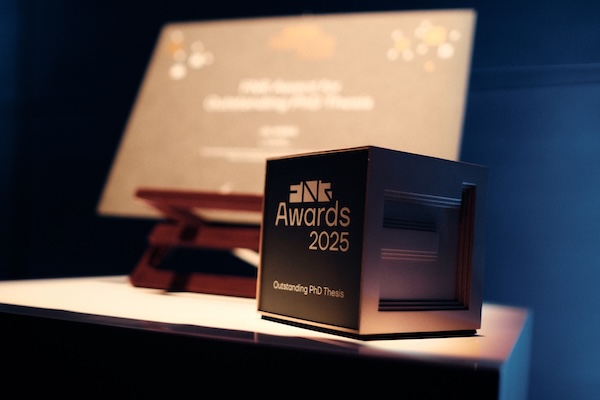 Credit: FNR / Steve Ginepri
Credit: FNR / Steve Ginepri
On Thursday 23 October 2025, the 17th edition of the Luxembourg National Research Fund (FNR) Awards took place at Maison des Arts et des Étudiants in Esch/Belval.
As reported by the FNR, the award ceremony welcomed over 200 attendees and took place in the presence of Stéphanie Obertin, Luxembourg Minister for Research and Higher Education. Five awards were presented across four categories.
First launched in 2009, the FNR Awards were created to publicly recognise scientific excellence and to give recognition to Luxembourg’s young research ecosystem. Over the years, the awards have evolved to include categories for scientific achievement, promotion of science to the public, outstanding PhD theses and mentoring.
The FNR stated: “Today, more than ever, in an information-saturated world, the Awards play a crucial role: by giving science a human face, they help build trust, visibility and connection with society.”
Outstanding Scientific Achievement: Awarded to Prof Andreas Fickers, Prof Dietmar Hüser, Prof Sonja Kmec and team for their project “Popular Culture Transnational—Europe in the Long 1960s”.
The FNR said: “The project "Popkult60" set new standards for understanding how pop culture shaped, and was shaped by, a rapidly changing Europe. In a transnational collaboration between historians in Luxembourg and Saarbrücken, the team conducted seventeen sub-projects exploring everything from rock music to children’s TV, dance halls and the Schueberfouer. By moving beyond national narratives, the project showed how cultural products crossed borders, transformed identities, and helped explain societal shifts in post-war Europe. Popkult60 reminds us that culture, often seen as entertainment, is also a lens to understand deep political, economic, and social change.”
Outstanding Promotion of Science to the Public: Awarded to Juliette Pertuy, Maia Haas, Maud Marocki, Selima Malsagova and Bo Byloos - Luxembourg Space Agency, for their project “Astronaut for a Day”.
The FNR said: “Inspiring the next generation of scientists and explorers, “Astronaut for a Day” offered 35 secondary school students a once-in-a-lifetime experience: flying in zero gravity. Organised by the Luxembourg Space Agency Foundation, this initiative combined a rigorous selection process with hands-on experiments in microgravity. More than a single event, the programme supported the students for a full year, turning them into ambassadors for science and space careers. Especially aimed at motivating young women, it addressed a growing talent gap in the space sector while making the physics of spaceflight tangible and inspiring.”
Outstanding PhD Thesis: Awarded to Florian Felten - University of Luxembourg / ETH Zurich, for their project “Artificial Intelligence with a Human Touch”.
The FNR said: “Florian Felten’s PhD thesis tackled a major limitation in current AI systems: their inability to understand and adapt to human preferences. Through pioneering work in multi-objective reinforcement learning, Felten developed methods that teach AI systems how to make nuanced trade-offs between speed and cost, efficiency and safety. His research spans from smarter travel planning to drone swarms for environmental monitoring. The result is AI that is not only more intelligent, but also more aligned with human values.”
Outstanding PhD Thesis: Awarded to Jill Kries - KU Leuven / Stanford University, for their project “Uncovering How the Brain Understands Speech”.
The FNR said: “How does the brain turn sound into meaning? Jill Kries' thesis bridges neuroscience and linguistics to answer this fundamental question. Using EEG, cognitive tests, and work with stroke patients suffering from aphasia, Kries identified key neural processes, such as the role of prosody (the rhythm and loudness of speech) that are vital for comprehension. Her findings not only deepen our understanding of the human brain but also point to new biomarkers and potential interventions for speech-language therapy.”
Outstanding Mentor: Awarded to Prof Christos Koulovatianos - University of Luxembourg.
The FNR said: “Described as rigorous, humble and inspirational, Christos Koulovatianos embodies what it means to be a scientific mentor. His philosophy: progress comes through small steps and mistakes are part of the journey. In creating safe spaces for trial and error, he encourages young researchers to grow not only academically, but personally. His students credit him with helping them publish, win scholarships, and discover their path—making him a quiet but powerful force in Luxembourg’s academic ecosystem.”








